Toyota Warranty Coverage Guide [Factory & Extended Warranty]
January 12, 2022
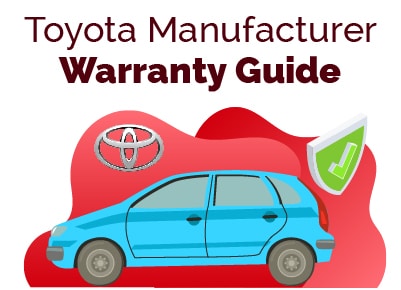

I am a serial entrepreneur and a consumer advocate. When I’m not helping car buyers, I love working on ventures that have a positive impact.
I run a cause marketing agency and serve on the board of Vayu Global Health where we are disrupting the medical industry and preventing the needless deaths of mothers and babies during childbirth.
Is your Toyota warranty about to expire? Or considering buying a new or used model?
In either case, you're going to want to protect your vehicle. Toyota offers different types of warranties, but how does it compare to services like Endurance, CarShield, and CARCHEX?
In this article, we'll dive into the different Toyota warranty options, including the standard and extended warranty options.
Table of Contents
- What Is the Standard Toyota Factory Warranty?
- What Is the Toyota Extended Warranty?
- How Much Does Toyota Extended Warranty Cost?
- What Is Not Covered by Toyota Extended Warranty?
- Should I Get the Toyota Extended Warranty Program?
- Toyota Extended Warranty vs. Third-Party Extended Warranty
- Can I Cancel the Toyota Extended Warranty?
- Does Toyota Have a Secret Warranty?
- What To Do When Your Toyota Car Warranty Expires
- Toyota Maintenance Guide
- Best Car Deals by Category
- Frequently Asked Questions
What Is the Standard Toyota Factory Warranty?
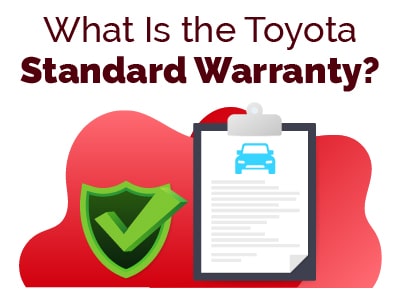 Your standard manufacturer warranty from Toyota lasts for 36 months or 36,000 miles, whichever happens first.
Your standard manufacturer warranty from Toyota lasts for 36 months or 36,000 miles, whichever happens first.
The warranty covers all major components of the vehicle, aside from normal wear or maintenance. It will cover repairs for defects of any Toyota-supplied part.
Toyota New Car Warranty
The basic Toyota new car warranty comes with 3 years or 26,000 miles of limited warranty coverage. The basic plan covers all parts aside from normal wear and tear/necessary maintenance.
Toyota Powertrain Warranty
Toyota’s powertrain coverage lasts 60,000 miles or 60 months, whichever comes first. It includes coverage of the transmission, engine, front-wheel drive, and rear-wheel drive.
Toyota CPO Warranty
For certified pre-owned vehicles, Toyota offers a 12-month/12,000-mile limited warranty that begins on the date of purchase. This warranty covers all repair/replacement of parts due to defects in workmanship or materials.
CPOs also include a 7-year/100,000-mile Limited Powertrain Warranty which starts on the date of purchase or after 100,000 miles. This warranty includes travel protection and reimbursement for meals when you travel 150 miles or more from home. It also provides alternate transportation reimbursement during vehicle repair.
Furthermore, with CPO warranties you get 24-hour roadside assistance for 7 years or up to 100,000 miles for issues like a flat tire, jump start, getting locked out, towing, or running out of gas.
Toyota Hybrid/EV Warranty
For every 2020 model year and newer Toyota hybrid or EV, the battery warranty lasts for 10 years or 150,000 miles (whichever comes first). They recently extended the warranty near the end of 2019.
Toyota Rust-Through Coverage
60,000 miles or 60 months of coverage for corrosion perforation of vehicle sheet metal.
Toyota Emissions Coverage
The emissions coverage varies based on state and national regulations.
What Is the Toyota Extended Warranty?
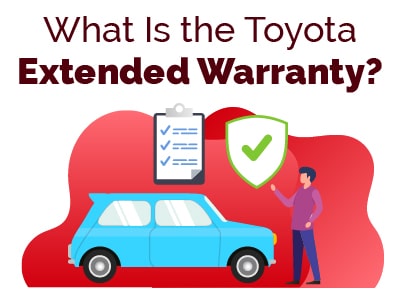 As your basic warranty nears its end, you can purchase an extended warranty. Here’s an overview of Toyota’s extended warranty plans, or Vehicle Service Agreements (VSA).
As your basic warranty nears its end, you can purchase an extended warranty. Here’s an overview of Toyota’s extended warranty plans, or Vehicle Service Agreements (VSA).
Toyota Powertrain Warranty
The most basic extended warranty option is the Powertrain warranty. It covers the engine, transmission, and axle for 6-years or 100,000 miles.
Toyota Gold Warranty
Toyota’s mid-tier extended warranty offers flexible contracts from 3-years/50,000 total miles to 8-years/125,000 total miles. It covers the engine, automatic/manual transmission, axle assembly, and alternative fuel components.
Toyota Platinum Warranty
This is the highest level of extended warranty coverage. You can add it to a new Toyota vehicle for either 3-years/50,000 miles or 10-years/125,000 miles.
For used Toyotas, you can add it for one year/12,000 miles or 5-years/60,000 miles.
This plan offers “bumper to bumper” protection which means it covers most components including engine, automatic/manual transmission, axle assembly, alternative fuel, suspension, steering, fuel system, cooling system, AC, heating, brakes, electrical, computer/electronics, and additional components.
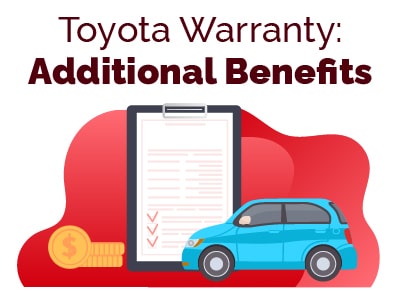 Toyota Warranty Additional Benefits
Toyota Warranty Additional Benefits
Extended warranties from Toyota come with additional benefits including:
- Toyota Roadside Assistance: 24-hour roadside assistance that includes fuel delivery, towing, and more.
- Travel Protection: Receive reimbursement for trip interruptions or rental cars.
- One-Time Warranty Transfer: Transfer the contract between private parties (like in the event of a vehicle sale).
How Much Does Toyota Extended Warranty Cost?
 The cost of your Toyota extended warranty varies depending on your vehicle model and trim, as well as the plan you select. In general, models with expensive, complicated, or rare parts will cost more to cover.
The cost of your Toyota extended warranty varies depending on your vehicle model and trim, as well as the plan you select. In general, models with expensive, complicated, or rare parts will cost more to cover.
On average, Toyota extended warranties cost roughly $1,000 to $1,500 which meets industry standards. As a word of caution, when buying from a dealership, the cost is usually included with the finance amount, which means you'll end up paying interest on it.
What Is Not Covered by Toyota Extended Warranty?
Toyota extended warranties do not cover routine maintenance, regular wear and tear on the vehicle, or environmental damage.
Should I Get the Toyota Extended Warranty Program?
Toyota’s are notoriously reliable cars. According to the 2021 J.D. Power Vehicle Dependability Study, Toyota was ranked second for mass-market vehicles. Consumer Reports ranked them third in reliability.
Overall, the vehicles are highly reliable. Still, that does not mean they will always be 100% free from issues. There is always a risk that you will experience an expensive breakdown, especially if the model has unique parts.
An extended warranty can help prevent you from unexpected costly repairs, and thus provides immense peace of mind. Furthermore, you can also enjoy the added benefits, like roadside assistance with an extended warranty.
Ultimately, the decision to buy an extended warranty is a personal decision that depends on several factors like:
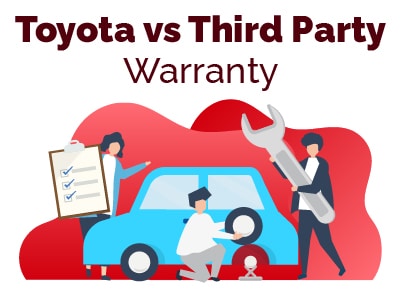 The age/condition of your vehicle
The age/condition of your vehicle- How long do you plan to keep the vehicle?
- Monthly budget
- Your savings
When looking into extended warranties, a manufacturer warranty is a strong bet. However, it’s best to look into all of the options and get quotes from third-party providers as well. Compare the cost, coverage, and reliability of multiple providers before making your decision.
Toyota Extended Warranty vs. Third-Party Extended Warranty
Toyota is not the only extended warranty provider. You can also consider third-party providers, including Endurance [Review], CarShield [Review], and CARCHEX [Review].
| Toyota | Endurance | CarShield | CARCHEX | |
| Start Date | ||||
| Availability | ||||
| Max Coverage Length | ||||
| Plan Options | ||||
| Transferable? | ||||
| Deductible | ||||
| Repair Network | ||||
| Cancellation |
Can I Cancel the Toyota Extended Warranty?
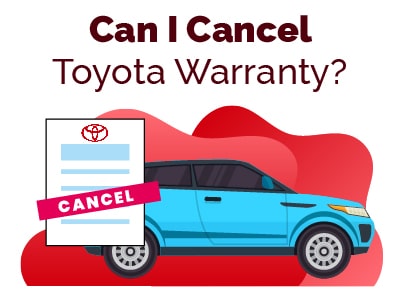 If you cancel your Vehicle Service Agreement within the first 30 days, you get a full refund. However, you must pay a $50 processing fee.
If you cancel your Vehicle Service Agreement within the first 30 days, you get a full refund. However, you must pay a $50 processing fee.
If you cancel after 30 days, then you will receive a prorated refund.
To cancel the Toyota extended warranty, you must reach out to the dealership. You will need to fill out a form with the current mileage and cancellation date. Both you and the dealership must sign this form.
Does Toyota Have a Secret Warranty?
Secret warranties are “goodwill programs” policy adjustments or extended warranties that are not explicitly sent to the customers they impact.
Back in 1988, a whistleblower uncovered 41 secret warranties from Toyota. Exposing these secret warranties helps ensure that customers can save money on repairs. It also encourages the manufacturers to build better cars to avoid having to pay out on these secret warranties.
As of right now, there is no information regarding active Toyota secret warranties.
What To Do When Your Toyota Car Warranty Expires
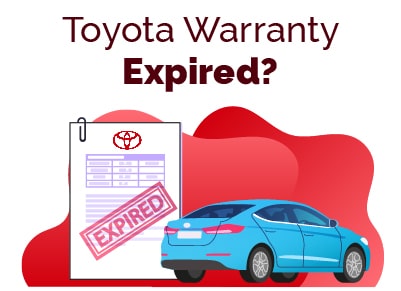 The original manufacturer’s warranty provides significant coverage, but it only lasts so long. Here are your options when your basic warranty comes to an end:
The original manufacturer’s warranty provides significant coverage, but it only lasts so long. Here are your options when your basic warranty comes to an end:
- Toyota Extended Warranty
- Third-Party Extended Warranty
- Keep the Car Without Warranty
- Sell the Vehicle
Note that you can only purchase a Toyota extended warranty before your basic warranty expires. This means you need to begin the process as your warranty comes to its end.
Therefore, here is what you should do when your basic warranty is nearing its end:
- Begin considering other warranty options within 3-months or 3,000 miles of your factory warranty’s end.
- Contact your Toyota dealership to discuss the cost and process for a manufacturer extended warranty.
- Obtain quotes for third-party warranties.
- Evaluate your monthly budget and savings.
- Assess how long you plan to keep your vehicle.
- If you plan to keep the vehicle for several years and find that a warranty is better suited to your budget than savings for repairs on your own, choose the best warranty.
- If you opt for the Toyota extended warranty, you must complete the process before your factory warranty expires.
Toyota Maintenance Guide
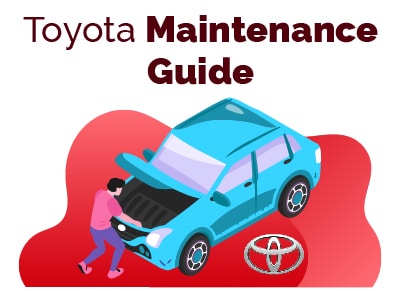 Toyota’s basic warranty and extended warranty do not cover routine maintenance. However, a lack of maintenance could prevent you from getting repairs covered. That’s why it’s vital to follow the manufacturer’s recommendations.
Toyota’s basic warranty and extended warranty do not cover routine maintenance. However, a lack of maintenance could prevent you from getting repairs covered. That’s why it’s vital to follow the manufacturer’s recommendations.
You can find detailed information about their recommendations on their website. There you can also enter specific vehicle information to get your recommended maintenance plan.
Be sure to check out our list of the best car-related subreddits, for Toyota-specific forums.
In general, Toyota recommends that you schedule a service appointment every 6-months or 5,000 miles (whichever comes first) with a Toyota technician. This routine maintenance may include oil changes, tire rotations, brake pads, and fluid levels.
Best Car Deals by Category
Frequently Asked Questions
How long does the basic Toyota warranty last?
The standard Toyota warranty lasts for 3-years or 36,000 miles, whichever comes first.
How long does the extended Toyota warranty last?
The length of your extended warranty depends on the flexible terms you choose. The longest extended warranty option is 10-years or 125,000 miles.
Does Toyota extended warranty cover tires?
The Toyota extended warranties do not cover tires. Instead, they offer separate plans for Tire & Wheel Protection.
Does Toyota extended warranty cover maintenance?
No, Toyota’s extended warranty plans do not cover routine maintenance. Instead, you can purchase a separate ToyotaCare plan for maintenance costs.
Is the Toyota’s extended warranty worth it?
To determine if Toyota’s extended warranty is worth it, assess your personal budget, savings, and car-ownership plans. Furthermore, you should compare extended warranties from third parties as well as Toyota to determine which would be the best deal for you.
Can I transfer my Toyota extended warranty?
Yes, Toyota extended warranties are transferable to subsequent owners.
Are Toyota cars expensive to repair?
Toyota repair costs vary in price depending on the parts, extent of damage, and type of vehicle. For example, exhaust pipe replacement tends to be around $550, but something like transmission replacement may cost up to $4,000.
Where can I take my Toyota for repairs under warranty?
Under both the basic warranty and Toyota extended warranty, you must take your vehicle to a Toyota dealership for all covered repairs.
Can I extend my Toyota warranty after it expires?
You must buy your extended warranty before your factory warranty expires. New Toyota vehicles within the basic warranty period of 3-years or 36,000 miles are eligible for an extended warranty.
How do I know when my Toyota warranty expires?
To check on the status of your factory warranty, you should have your VIN and odometer reading handy. Call your local dealership and provide them with this information. They can then look up your vehicle to let you know how much coverage you have left.
Posted in Car Buying Tips, Car Warranty |
- Car Extended Warranty Guide
- Different Types of Car Warranties
- What's the Deal with Extended Warranties in California?
- Hybrid & EV Battery Warrranty Guide
- Best Warranty Provider Comparison
- Calculate Extended Warranty Cost
- What Can Void a Car Warranty?
- Interesting Car Warranty Statistics
- How to Stop Car Warranty Calls






